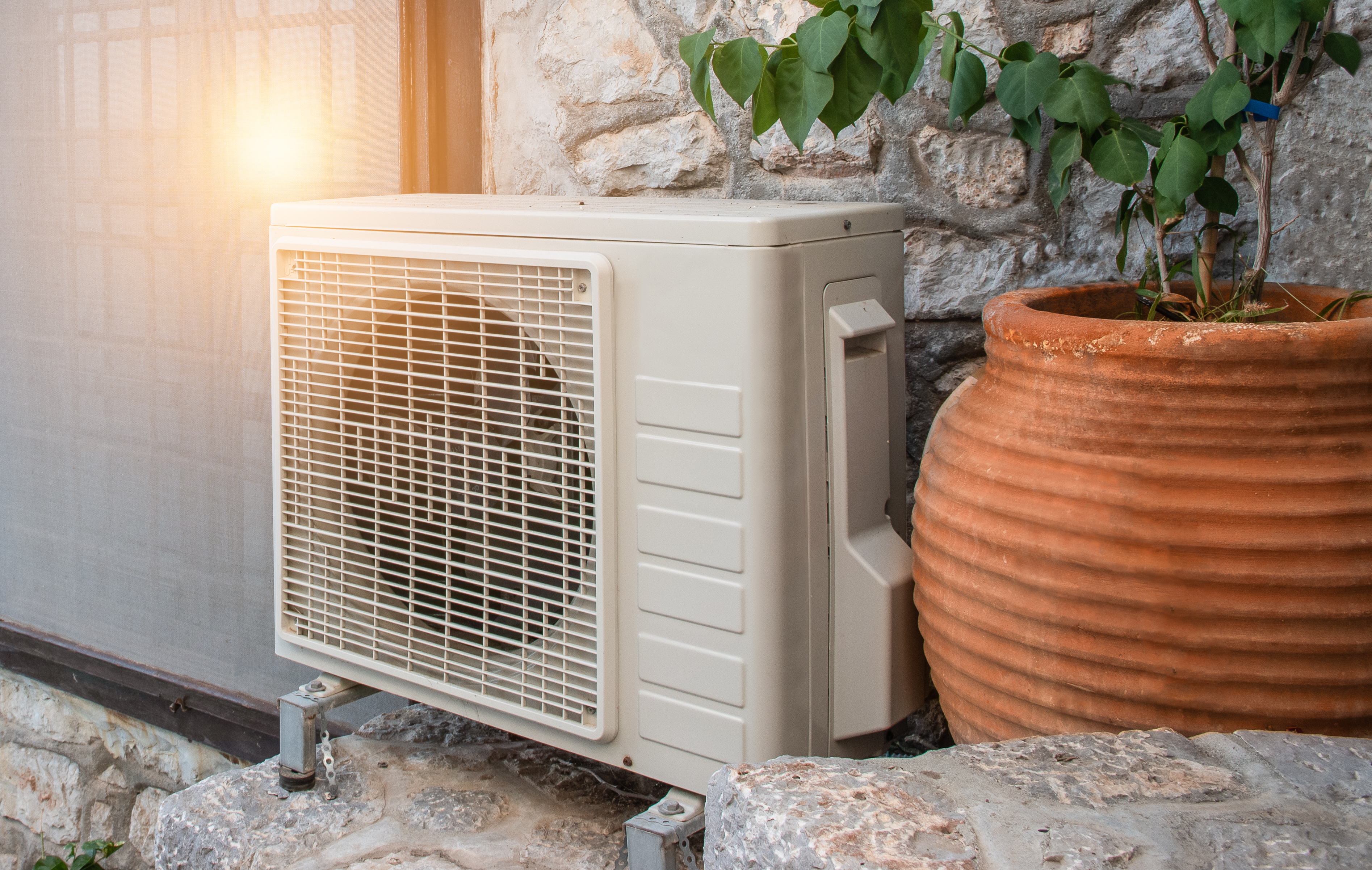Everything you need to know about heat pumps
Sales of these "humble" heating and cooling appliances surpassed those for gas furnaces in 2022. What's all the fuss?


A free daily email with the biggest news stories of the day – and the best features from TheWeek.com
You are now subscribed
Your newsletter sign-up was successful
Heat pumps are gaining popularity in the United States. This "humble" appliance is a cost-effective and eco-friendly alternative to traditional heating and cooling systems, NBC News explains. They already account for "more than half of all residential heating sales" in the U.S. Here's what you need to know:
What is a heat pump? How does it work?
A heat pump is an electric appliance that can both heat and cool a home. In cold weather, it pumps heat from outside in, compressing it along the way; in warm weather, it pumps the heat from inside out, "which is also how a typical air conditioner works," explains The Washington Post.
Heat pumps are more cost-effective than a traditional furnace or air conditioner, and they're also more convenient, because they combine a home's heating and cooling apparatuses into one. They're also better for the planet, since they rely on electricity rather than fossil fuels and simply move heat from one place to another. "Exchanging heat in this way is much more efficient than generating it," says Wired.
The Week
Escape your echo chamber. Get the facts behind the news, plus analysis from multiple perspectives.

Sign up for The Week's Free Newsletters
From our morning news briefing to a weekly Good News Newsletter, get the best of The Week delivered directly to your inbox.
From our morning news briefing to a weekly Good News Newsletter, get the best of The Week delivered directly to your inbox.
When comparing an "efficient gas furnace" to a solid heat pump system, a home using a heat pump "would reduce its greenhouse gas emissions by about 55 percent over 15 years," Neil Kolwey, a building electrification specialist at the public-interest organization Southwest Energy Efficiency Project, told NBC News.
Where are they growing in popularity?
Everywhere. In 2021, 4 million heat pumps were installed in the U.S., up from 1.7 million in 2012, writes Wired. In 2022, they "surpassed gas furnaces in annual sales by a wide margin," adds The New York Times. Regionally, you're more likely to find heat pumps in the South, since they don't have to work as hard in warmer weather. Even so, usage continues to grow in the Northeast and Northwest, where subzero winter temperatures are the norm.
Across the pond, "heat pumps are increasingly seen as a way to reduce Europe's reliance on gas, particularly as Russia threatens to choke off the continent's supply," Politico reported in August. There, the machines are actually most common in the continent's coldest climates, like those of Norway, Sweden, Finland, and Estonia. And even China has gotten in on the craze — as of Nov. 30, 2022, the country was leading the world in new heat pump sales.
Do heat pumps work in the cold?
Though they operate less efficiently in freezing or subzero temperatures, many heat pumps still work normally "in temperatures down to minus 13 degrees Fahrenheit, or minus 24 Celsius," the Times writes. "We're starting to see evidence that the myth [of poor function in the cold] has been kept alive by people with an entrenched interest in avoiding the adoption of heat pumps," Sam Calisch, head of special projects at nonprofit Rewiring America, told the Times.
A free daily email with the biggest news stories of the day – and the best features from TheWeek.com
But for those in areas where temperatures consistently drop below minus 20 degrees Fahrenheit, some sort of hybrid heating approach may work best, if only for peace of mind. Perhaps add "electric heat strips to a heat pump's indoor unit, which turn on for additional warmth as backup in especially cold weather," the Post suggests, or maybe opt to maintain (but sparingly use) a backup furnace dedicated exclusively to extreme temperature conditions.
How do I know if a heat pump is right for me?
If you're interested in replacing your traditional furnace with a heat pump, start planning for the switch now. Heat pumps are in high demand at the moment, meaning it's often difficult to procure one on short notice — and you don't want to wait until your old system dies. If your furnace is already close to the end of its useful life, you shouldn't feel bad about upgrading, the Post says. But if your home isn't already well insulated, "[y]our expensive investment in a heat pump will just go out the window — and the floorboards, the attic, and doors" — so make sure that's squared away, too.
Of course, you'll need to consider the cost of installment, as well. Putting in an "air-to-air heat pump can cost between $7,000 and $15,000 on average," though local incentives — as well as an $8,000 federal rebate brought to you by the Inflation Reduction Act — might help "defray the cost," per the Post.
Plus, using a heat pump will save the "average household or business" money compared to using a gas boiler, Yannick Monschauer, an energy analyst at the International Energy Agency, told NBC News. "And the savings offset the higher upfront cost of heat pumps in many markets today, including in the U.S., even without subsidies."
Brigid Kennedy worked at The Week from 2021 to 2023 as a staff writer, junior editor and then story editor, with an interest in U.S. politics, the economy and the music industry.
-
 Crisis in Cuba: a ‘golden opportunity’ for Washington?
Crisis in Cuba: a ‘golden opportunity’ for Washington?Talking Point The Trump administration is applying the pressure, and with Latin America swinging to the right, Havana is becoming more ‘politically isolated’
-
 5 thoroughly redacted cartoons about Pam Bondi protecting predators
5 thoroughly redacted cartoons about Pam Bondi protecting predatorsCartoons Artists take on the real victim, types of protection, and more
-
 Palestine Action and the trouble with defining terrorism
Palestine Action and the trouble with defining terrorismIn the Spotlight The issues with proscribing the group ‘became apparent as soon as the police began putting it into practice’
-
 How climate change is affecting Christmas
How climate change is affecting ChristmasThe Explainer There may be a slim chance of future white Christmases
-
 Why scientists are attempting nuclear fusion
Why scientists are attempting nuclear fusionThe Explainer Harnessing the reaction that powers the stars could offer a potentially unlimited source of carbon-free energy, and the race is hotting up
-
 Canyons under the Antarctic have deep impacts
Canyons under the Antarctic have deep impactsUnder the radar Submarine canyons could be affecting the climate more than previously thought
-
 NASA is moving away from tracking climate change
NASA is moving away from tracking climate changeThe Explainer Climate missions could be going dark
-
 What would happen to Earth if humans went extinct?
What would happen to Earth if humans went extinct?The Explainer Human extinction could potentially give rise to new species and climates
-
 Bacteria can turn plastic waste into a painkiller
Bacteria can turn plastic waste into a painkillerUnder the radar The process could be a solution to plastic pollution
-
 Florida has a sinking condo problem
Florida has a sinking condo problemUNDER THE RADAR Scientists are (cautiously) ringing the alarms over dozens of the Sunshine State's high-end high-rises
-
 Diamonds could be a brilliant climate solution
Diamonds could be a brilliant climate solutionUnder the radar A girl and the climate's best friend
